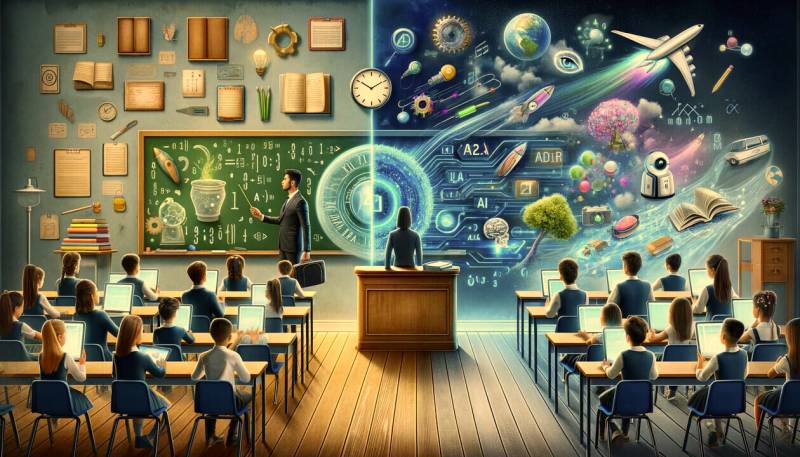
Artificial intelligence (AI) is changing many fields around the world, including education, thanks to fast progress in technology. In the classroom, AI-driven solutions are taking the place of memorisation and standard teaching methods to make learning more personalised, effective, and interesting. AI has the ability to change the world, but there are issues that need to be thought through when it comes to using it in schools.
One of the best things AI has done for education is make learning more personalised. A one-size-fits-all method in traditional schools can make students feel overwhelmed or not challenged enough. Adaptive learning software powered by AI can evaluate a student's work, figure out their skills and weaknesses, and tailor their lessons to their needs.
DreamBox, Knewton, and ScribeSense all use formulas to make sure that students know the basics of a subject before moving on to more complicated ones. Kids can learn at their own pace with these tools, which helps them understand and boosts their confidence. When there are a lot of kids in a Pakistani school, personalised methods help them all learn in the best way possible.
AI automates everyday tasks and gives teachers data-driven insights that help them do a better job. Teachers can use Grammarly and Turnitin to help them grade and give feedback. This cuts down on routine work, so teachers can focus on making lessons more creative and interactive.
Some examples of virtual teaching tools are chatbots with AI, such as ChatGPT. With these tools, kids can always ask questions and learn more about tough subjects. You can get help whenever you need it, which is great for students who are learning at home or who are shy in class.
AI is helping kids with disabilities get to school more easily. Students who are blind or have trouble hearing can join in class with the help of text-to-speech and speech-to-text apps. Students who don't speak English can use Google Translate and other AI-based language translators to get to learning materials that are written in their own languages.
AI-powered learning platforms can also make groups where everyone feels welcome by providing special materials for students with dyslexia and ADHD. No matter how smart or athletic a student is, these tools give them all the same chances to learn and do well.
Artificial intelligence is not a replacement for education but a powerful tool to enhance its quality, accessibility, and relevance
Regular tests in standard schools only show a small part of what a student can do. AI makes it possible for reviews to happen all the time and help shape the process, which changes it. In real time, AI systems can tell students what they did well and what they could do better. Edmodo and Quizlet both use AI to test how much students learn, how well they can think, and how well they can solve problems.
By getting rid of subjective factors, these methods make scoring more fair and uniform. This is very important in Pakistan because kids could fall behind if they are marked unfairly. AI can make school more fair and open by taking tests for you.
One of the biggest criticisms of traditional education systems is their disconnect from the job market’s needs. AI has the potential to bridge this gap by equipping students with the skills required for the 21st-century workforce. Platforms like LinkedIn Learning and Coursera leverage AI to recommend career-relevant courses based on a student’s interests and industry trends.
Incorporating AI into education can also simulate real-world scenarios through technologies like virtual reality (VR) and augmented reality (AR). Medical students, for instance, can use AI-powered simulators to practice surgical procedures, while engineering students can work on virtual prototypes. These hands-on experiences not only enhance learning but also prepare students for future challenges in their respective fields.
While the benefits of AI in academics are undeniable, its adoption raises several ethical concerns. Data privacy is a significant issue, as AI systems require access to vast amounts of student information to function effectively. Safeguarding this data from breaches and misuse is paramount to maintaining trust in AI-driven education.
Moreover, the integration of AI into education risks widening the digital divide. In countries like Pakistan, where access to reliable internet and technology is limited, the benefits of AI may remain confined to urban and affluent areas. Ensuring equitable access to AI-powered tools is essential for preventing further educational disparities.
There is also the question of over-reliance on technology. While AI can augment teaching, it cannot replace the human touch that educators bring to the classroom. Emotional intelligence, empathy, and mentorship are qualities that no AI system can replicate. Striking a balance between technology and traditional teaching methods is crucial for maintaining the holistic development of students.
To harness the full potential of AI in academics, governments, educators, and tech companies must collaborate to address these challenges. Policymakers must prioritise investments in digital infrastructure and training programs to equip teachers with the skills needed to integrate AI into their classrooms effectively.
Educational institutions should also foster a culture of continuous learning by encouraging teachers and students to adapt to technological advancements. Workshops, seminars, and certification programs can play a vital role in building confidence in AI tools and highlighting their practical applications.
Artificial intelligence is not a replacement for education but a powerful tool to enhance its quality, accessibility, and relevance. By personalising learning, improving assessments, and bridging the gap between academics and employment, AI has the potential to revolutionise the way we teach and learn. However, its implementation must be guided by ethical considerations and a commitment to inclusivity.
For countries like Pakistan, embracing AI in education could be a game-changer. By addressing existing disparities and preparing students for the demands of the global economy, AI can help unlock the immense potential of Pakistan’s youth. The future of education lies in innovation, and with the right approach, AI can pave the way for a smarter, more equitable, and prosperous world.

